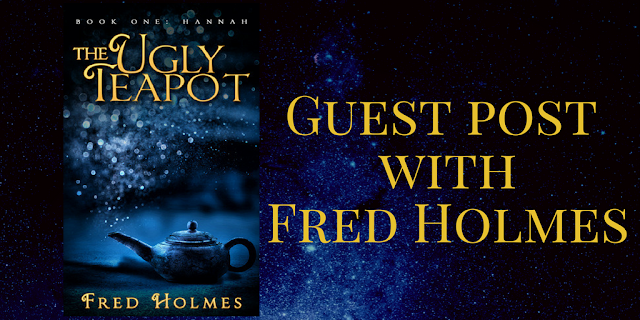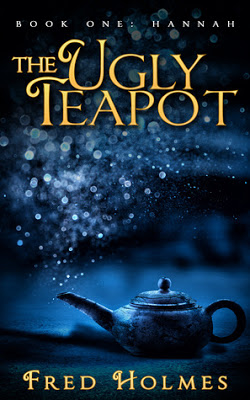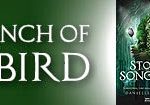Hi everyone! Please welcome to the blog Fred Holmes, author of The Ugly Teapot, who is here to tell us about how he went from being a TV director and screenwriter to a Novelist! Doesn’t that sound awesome? But before you head over to his awesome guest post (you must read it, it’s amazing!), here’s more info about The Ugly Teapot which looks and sounds amazing and I cannot wait to dig into my copy. Enjoy & thanks for stopping by!
Fourteen-year-old Hannah Bradbury loved her father so much that she worried about him constantly. After all, he was a photographer who traveled to the most dangerous places in the world.To allay her fears, each time he came home he brought her silly gifts, each one with supposed magical powers: the Seal of Solomon, the Ring of Gyges, even Aladdin’s Lamp. It was that lamp Hannah found the most unbelievable, for it looked like an ugly teapot. Nevertheless, her father assured her it was real, and made her promise to save her three wishes for something very special.
Then . . . six months later . . . the unthinkable happened. Her father was killed while on assignment to Baghdad. And so on the day of his funeral Hannah did something she never thought she would ever do.
She took out that teapot and gave it a rub . . .
The Ugly Teapot by Fred Holmes is a timeless tale, filled with magic and adventure. More importantly, it will make you believe in the overwhelming power of love.
I didn’t start out to be a writer. I know that sounds kind of weird for a novelist to say, but I really never saw myself as a writer. What I wanted to do coming out of college was direct films and television. I received a couple of grants from NET (National Educational Television—PBS) to make movies while I was in school, and these helped me get my first professional job in the motion picture industry—as a film editor. I edited national TV commercials and other kinds of films, and this led, eventually, to me directing those films.
From commercials I moved on to directing television documentaries all over the world, plus corporate videos and industrial films, and these, eventually led to me directing TV shows and movies. I gravitated toward children’s television (because I’m a kid at heart), and I worked on such shows as WISHBONE, BARNEY & FRIENDS, HORSELAND, IN SEARCH OF THE HEROES, MARY LOU RETTON’S FLIP FLOP SHOP, and many, many other international television programs. To date I’ve directed more than 250 episodes of television, and have been nominated for Emmys five times and have won twice. I’ve also won three CINE Golden Eagles, and numerous other awards.
I’ve also directed three feature films: DAKOTA, starring Lou Diamond Phillips, distributed by Miramax; HARLEY, starring Lou Diamond Phillips, distributed by Lionsgate; and HEART LAND, a Bollywood feature film I directed in India, that starred two Indian superstars, Divya Dutta and Prem Chopra.
Why am I telling you all of this? Because when you direct that many scripts written by other people, you learn a little something about what NOT to do. It didn’t take me long to become frustrated by the quality of scripts I was being asked to direct. Of course no one would hire me to write these scripts because, well, I wasn’t a writer, so what did I do about it? I started writing my own screenplays on spec. This was a challenge for someone who hadn’t started out to be a writer, but writing screenplays came pretty easy to me. Yes, I did my homework. I studied great screenplays and talked to those who were writing them, and what I learned was that you didn’t have to know a lot about grammar, etc., to write screenplays. Yay for me!
Scripts have their own unique language and style, and they’re very impressionistic and use few words (when done right). Read William Goldman’s script for BUTCH CASSIDY AND THE SUNDANCE KID, or Shane Black’s script for LETHAL WEAPON. These are just two examples of the kind of shorthand you find in good scripts.
Scripts are also blueprints—they’re meant to be filmed, not read—so at best they convey the emotion of a story. I should also point out that I’m talking about the sales draft of a screenplay, not the shooting script. The sales draft is the draft your agent will submit to production companies. You need to keep this draft fast paced and fluid and easy to read. The joke in Hollywood is that production executives don’t read, and I’ve found this to be true. After they’ve read your script, they’ll invariably want you to come in for a pitch meeting and “tell” them the story. Doing this is an art form in itself, and we could devote a whole post to it, but suffice to say one of the skills you have to learn in order to sell spec scripts in Hollywood is the ability to verbally motivate someone about your story. How does your sales draft differ from a shooting script? Whereas your sales draft is all about selling the story, the shooting script is designed to be shot. You’re creating a document that all of the different department heads will work from, and it has its own language and structure that I would love to tell you about, but you would probably go to sleep on me.
So how and why did I transition from writing screenplays to writing novels? The “why” came out of frustration. I’d written some screenplays that had been well-received and optioned numerous times, but never produced. As a sidebar, I should mention that during this same time period I was writing a lot of television and that was going really well, but I wasn’t having the same luck with my screenplays for feature films. One of these screenplays was called FIREFLIES. Everyone who read it, loved it, and it was optioned several times. If you don’t know what option deals are in Hollywood, I’ll have to tell you about them in another post, as they’re fairly involved. The short story is this: FIREFLIES was very well received by some high profile producers, including Jerry Molen who won the Academy Award for producing SCHINDLER’S LIST (along with Spielberg and Branko Lustig). Jerry loved FIREFLIES, but was never able to get it made for a variety of frustrating reasons. Then a friend of mine at Disney read it and loved it and suggested I turn it into a novel. I had never thought of doing such a thing—I wasn’t a “real” writer remember? I was untrained, unschooled, but I was intrigued by the idea. So I started reading everything I could about writing novels, and I talked to people who were doing it, and I reintroduced myself to good grammar, then I started writing draft after draft after draft after draft…until finally one day an agent in New York read it and said, “Wow, this is really good.”
It wasn’t easy, and it took long while, but here I am! And what has helped me is that novels have changed dramatically over the last few decades. They’ve become less structured and more impressionistic (more like screenplays!), which I absolutely love and am trying to get better at. But there you have it. FIREFLIES became THE UGLY TEAPOT, and now it’s out in the cold, cruel world trying to find its way into the hearts and minds of readers, and I’m hard at work on the sequel. I hope you’ll check it out! Even ugly teapots deserve love!
Thank you so much again for this awesome post, Mr. Holmes! You worked with so many of my childhood favorites that I feel like I will end up loving The Ugly Teapot! Guys, don’t forget to grab a copy of this book & look forward to my review on the blog soon!
……….
About Fred Holmes
THE UGLY TEAPOT is Fred Holmes’s first fiction novel, having previously ghost written a nonfiction book, LETTERS FROM DAD, published by Thomas Nelson. He is known primarily as a writer and director of films and television, working primarily in family films and children’s television. His work can be seen on Mary Lou Retton’s FLIP FLOP SHOP, BARNEY & FRIENDS, WISHBONE, HORSELAND, IN SEARCH OF THE HEROES, and many other shows, for which he has won two Emmys and three CINE Golden Eagles, among numerous other awards. He has also directed three feature films, including DAKOTA, starring Lou Diamond Phillips, distributed by Miramax, and HEART LAND, a Bollywood feature film shot on location in India. He lives with his wife and son in the southwest United States, and can be found online at www.flholmes.com







Thanks for the post, Melissa and Flor! I'm looking forward to your review! 🙂
Thanks for writing such a great post for our blog!